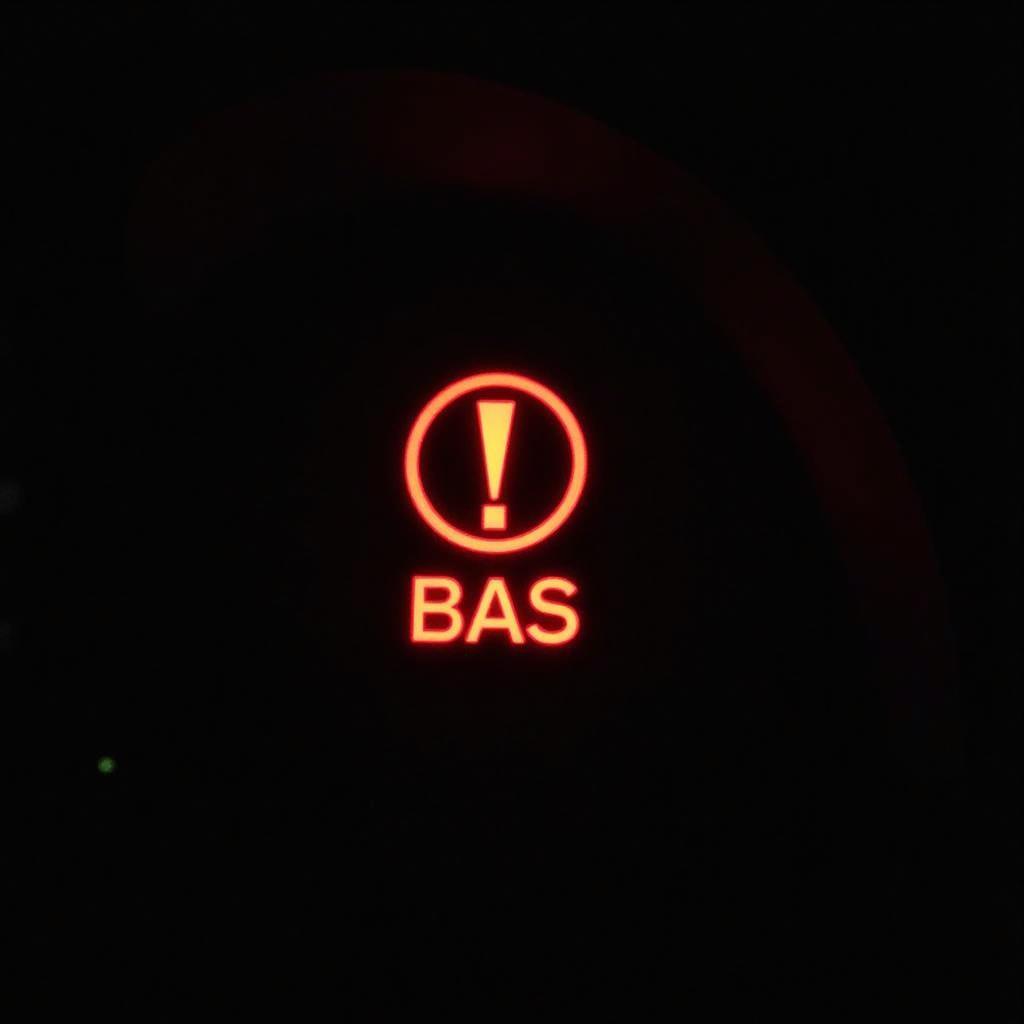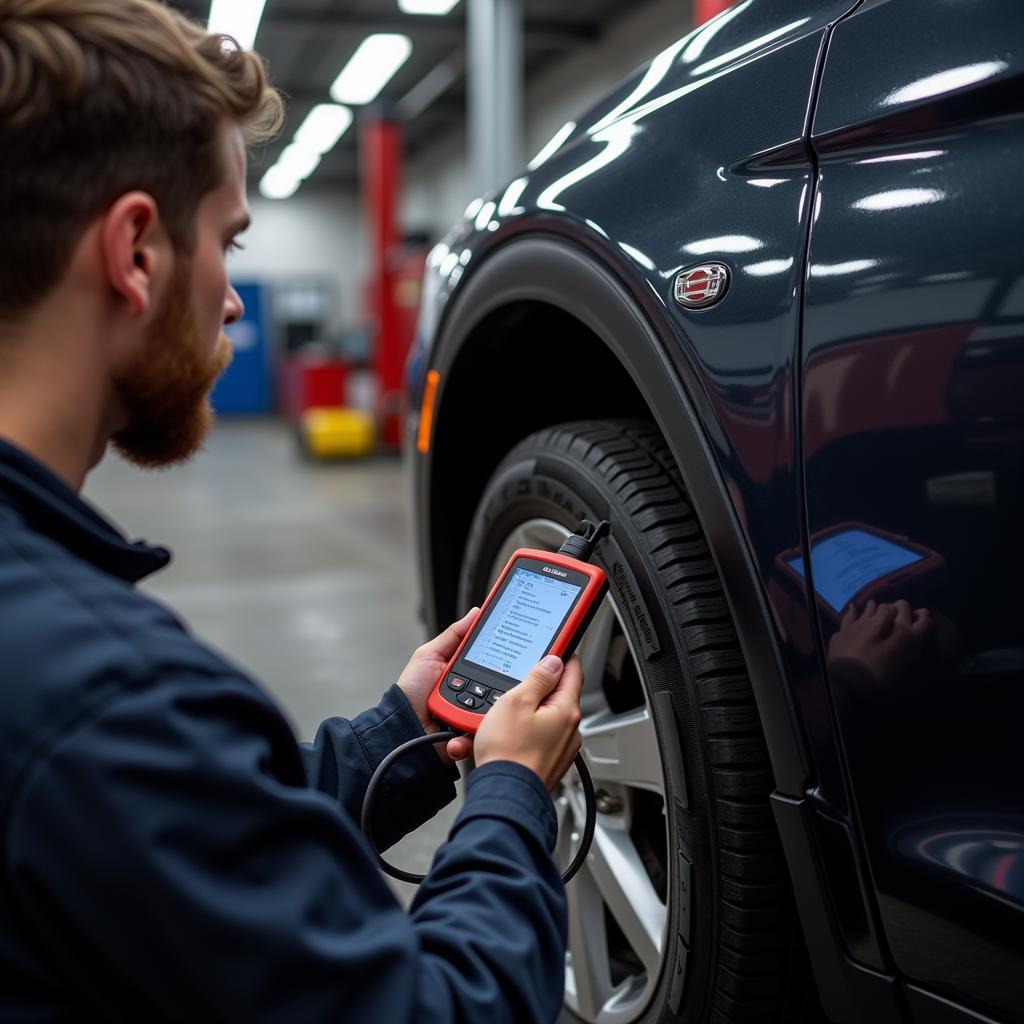Imagine this: you’re driving your car when suddenly a “Brake Assist Visit Workshop BAS” warning pops up on your dashboard. What does it mean? Is it safe to keep driving? This scenario can be unsettling, but understanding this warning and knowing how to address it can save you time, money, and potential headaches on the road.
Decoding the Brake Assist Visit Workshop BAS Warning
The “Brake Assist Visit Workshop BAS” warning signals a problem within your car’s Brake Assist System (BAS) or Electronic Stability Program (ESP), both crucial components of your vehicle’s safety features. While the specific cause can vary, this warning usually indicates an issue with the system’s sensors, control unit, or wiring.
 Brake Assist Warning Light
Brake Assist Warning Light
Why is My Brake Assist System Important?
The Brake Assist System acts as your co-pilot in emergency braking situations. It senses rapid or panicked braking and automatically applies maximum braking force, potentially preventing a collision. The ESP works in conjunction with the BAS to maintain vehicle stability and prevent skidding, especially on slippery surfaces or during sharp turns.
Common Causes of the Warning
Several factors can trigger the “Brake Assist Visit Workshop BAS” warning. Here are some of the most common culprits:
- Faulty Brake Light Switch: Your brake light switch plays a crucial role in informing the BAS when you’re braking. A malfunctioning switch can disrupt this communication, leading to the warning light.
- Wheel Speed Sensor Issues: The BAS relies on wheel speed sensors to monitor each wheel’s rotational speed. If a sensor malfunctions or gets coated in dirt or debris, it can send inaccurate data to the BAS, triggering the warning.
- Low Battery Voltage: Like many electronic systems in your car, the BAS depends on a stable voltage supply. A weak or dying battery can disrupt the system’s operation, causing the warning light to illuminate.
- Wiring Problems: Wires and connectors within the BAS system can become damaged or corroded over time. This disruption in communication can also lead to the warning.
- Control Unit Malfunction: In some cases, the BAS control unit itself may malfunction, requiring diagnosis and potential replacement by a qualified technician.
 Mechanic Diagnosing Brake Assist System
Mechanic Diagnosing Brake Assist System
What to Do When You See the Warning
Seeing any warning light related to your brakes can be concerning. However, it’s crucial to remain calm and follow these steps:
- Don’t Panic: While the warning indicates a potential issue, your brakes may still function normally.
- Assess Your Surroundings: If possible, safely pull over to the side of the road and turn off your engine.
- Check Your Brake Fluid: A low brake fluid level can contribute to braking issues. If you’re comfortable doing so, check your brake fluid level and top it off if necessary.
- Avoid Driving Long Distances: If the warning persists, avoid driving long distances and contact a qualified mechanic as soon as possible.
Diagnosing the Problem
Accurately diagnosing the root cause of the “Brake Assist Visit Workshop BAS” warning often requires specialized diagnostic equipment. A qualified mechanic can:
- Retrieve Fault Codes: Using a professional-grade OBD-II scanner, a mechanic can read the specific fault codes stored in your car’s computer, pinpointing the problematic area.
- Inspect System Components: A visual inspection of the BAS components, including sensors, wiring, and the control unit, can reveal potential issues like damage, corrosion, or loose connections.
- Test System Functionality: Mechanics can perform tests to assess the functionality of the BAS, including sensor readings and system response.
Fixing the Issue
The repair solution for a “Brake Assist Visit Workshop BAS” warning depends entirely on the diagnosed problem. Some common fixes include:
- Replacing a Faulty Brake Light Switch: This is often a straightforward and relatively inexpensive fix.
- Cleaning or Replacing Wheel Speed Sensors: If dirt or debris is the culprit, a simple cleaning might suffice. However, a faulty sensor will require replacement.
- Addressing Battery Issues: A failing battery may require charging or replacement.
- Repairing or Replacing Wiring: Damaged or corroded wires will need to be repaired or replaced to ensure proper communication within the system.
- Replacing the BAS Control Unit: In more severe cases, the BAS control unit itself might need replacement.
Ignoring the Warning: A Risky Gamble
While it might be tempting to ignore the “Brake Assist Visit Workshop BAS” warning, especially if your brakes seem to be working fine, doing so can have serious consequences. Ignoring the warning could lead to:
- Reduced Braking Assistance: A malfunctioning BAS might not provide the expected braking force in an emergency, increasing the risk of an accident.
- Compromised Vehicle Stability: A faulty ESP can increase the risk of skidding or losing control, particularly in challenging driving conditions.
- Further Damage and Costly Repairs: Ignoring the warning can allow minor issues to escalate into major problems, potentially resulting in more expensive repairs down the line.
Prevention is Key
Like most car issues, preventative maintenance is often the best approach. Regular servicing can help prevent “Brake Assist Visit Workshop BAS” warnings by:
- Ensuring Proper Brake Fluid Levels: Regularly checking and topping off your brake fluid can prevent issues related to low fluid levels.
- Inspecting Brake System Components: During routine maintenance, a mechanic can inspect your brake system, including BAS components, for potential issues.
- Addressing Battery Health: Having your battery regularly tested and replaced when necessary can prevent voltage-related problems.
Don’t Wait for Disaster to Strike: Address the Warning Today!
The “Brake Assist Visit Workshop BAS” warning should never be ignored. Addressing the issue promptly ensures your safety and the optimal performance of your vehicle’s essential safety systems. If you encounter this warning, consult a qualified mechanic immediately to diagnose and rectify the problem. Remember, proactive car care is always the safest and most cost-effective approach.
